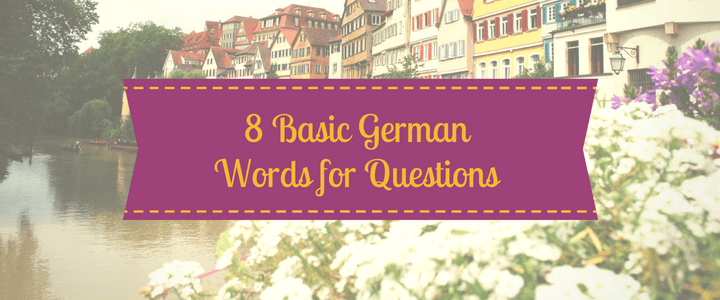
Learning how to ask some basic questions in German will help you engage more with others and develop your language skills.
Conversations need to be two-way, and the more you ask questions, the faster you’re going to learn.
Using the German question words in this tutorial, you’ll be able to ask how much something costs, where someone is from, and more. Let’s get started!
8 German Words for Questions
In order to ask basic questions in German, you’ll need to memorize some new vocabulary. Here are eight German question words you can use in everyday conversation.
- Wo (where)
- Woher (where from)
- Wohin (where to)
- Wann (when)
- Was (what)
- Wer (who)
- Wie (how)
- Warum (why)
You may notice that there are multiple ways to ask questions with the word “where.” Depending on the context of what you are asking, the word you use for “where” will differ. Check out the following sentences for examples of their usage.
- Wo wohnst du? (Where do you live?)
- Woher kommst du? (Where are you from?)
- Wohin gehst du diesen Sommer? (Where are you going to go this summer?)
- Wann fliegst du nach Deutschland? (When do you fly to Germany?)
- Was machst du dieses Wochenende? (What are you doing this weekend?)
- Wer ist das? (Who is that?)
- Wie alt bist du? (How old are you?)
- Warum gehst du nach Hause? (Why are you going home?)
All of the German question words start with the letter “W.” Remember to pronounce the “W”s in German as you would pronounce a “V” in English.
You also need to remember that in German, questions might be worded a little differently than what you’re used to. For example, when you want to know somebody’s name in English you ask: What is your name?
This example uses the word “what.” But in German, you would use the word wie, which means “how.” For example: Wie ist dein name? (literally: how is your name?). You can also ask: Wie heißt du? (literally: how are you called?).
How to Form Sentences with German Question Words
To structure a question in German using your newly learned vocabulary, you must start with the question word first. Next you’ll add the inflected verb in the second position, and then finally – the subject.
If there is anything else within the question, then it will follow the subject. For example:
Wohin gehst du? (Where are you going?)
In this sentence, Wohin (where to) is the question word, gehst (go) is the inflected verb, and du (you) is the subject.
Here is another example:
Warum wohnt er jetzt in Deutschland? (Why does he live in Germany now?)
Here, Warum (why) is the question word, wohnt (live) is the verb, er (he) is the subject. Jetzt in Deutschland (now in Germany) is the rest of the information, which will always go last.
Differences Between German and English Questions
As you can see, the sentence structure for forming basic questions in German differs from English. In German you have the question word, then the verb, and then the subject. However in English, we use verb phrases which are split with the subject.
Let’s go back to the example above:
Wohin gehst du? (Where are you going?)
In the English version, you have the word “where” first. Then “are,” which is the first part of the verb phrase, is followed by the subject, “you.” Finally, the second part of the verb phrase – “going” – completes the question.
When asking a question in German, these verb phrases aren’t necessary. This is because in German, the present tense conjugation of a verb can be interpreted in three different ways in English. For example, er wohnt translates to:
- He lives
- He does live
- He is living
Because of this, German questions might seem like they’re missing an element or two when compared to their English counterparts. But they are actually more simple than questions in English.
10 Basic Questions in German
Now that you know how to form questions there will be no stopping you! To start practicing your skills, here are 10 basic questions in German that every beginner should know. Try to figure out the literal meaning of each sentence for extra practice.
- Wie geht es dir? (How are you?)
- Woher kommst du? (Where are you from?)
- Wie spät ist es? (What time is it?)
- Wie ist das Wetter? (How is the weather?)
- Wie weit ist es? (How far is it?)
- Wo sind die Toiletten? (Where are the restrooms?)
- Wo kann ich _____ kaufen? (Where can I buy _______?)
- Was kostet das? (How much is it?)
- Wo finde ich ein Geldautomat? (Where do I find an ATM?)
- Wann fährt den Zug/das Flugzeug ab? (When does the train/plane depart?)
Hopefully these questions inspire you to go spark up some conversations with new friends. If you feel like you need more guidance though, try working with a großartig (German teacher) to really take your skills to the next level.
Taking private German lessons is very beneficial as you’ll get to work at your own pace, following a curriculum that is tailored to your individual needs and goals. Best of luck learning German!
 Post Author: Sam G. Sam G. has been teaching German since 2014 in Asheville, NC. She has a Master’s in German Studies from the University of Florida and experience developing unique curriculum for a variety of students. Learn more about Sam here!
Post Author: Sam G. Sam G. has been teaching German since 2014 in Asheville, NC. She has a Master’s in German Studies from the University of Florida and experience developing unique curriculum for a variety of students. Learn more about Sam here!Jessica Dais
